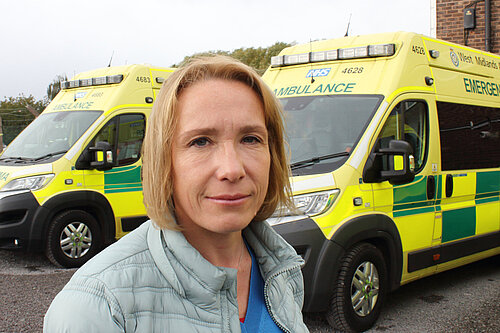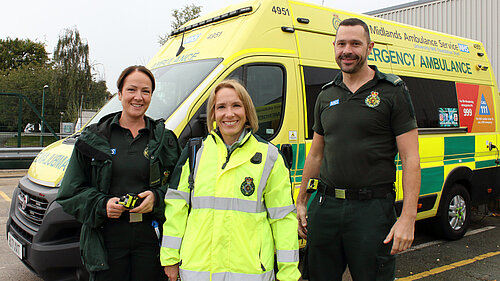
Helen Morgan responds to new Shropshire ambulance data
MP and health campaigner Helen Morgan has said she remains ‘worried sick’ about emergency care in Shropshire but is relieved that some progress has been made.

Helen Morgan gives a first-hand account of her 12-hour shift with a West Midlands Ambulance Service crew in Shropshire:
It’s midday on a wet and windy Friday afternoon. Normally I’d be in a village hall for an advice surgery with constituents. Instead, I’m hurtling down an A road being deafened by a siren in the back of an ambulance.
I’m with paramedics Steve and Julie and we’re responding to the first call of our 12-hour shift. It’s only minutes since we clocked on but the elderly lady in need of help has been waiting more than three hours. She’s got Covid symptoms and chest problems making her a category two call with a target response time of 18 minutes.
Indeed, by the time we pack up just before 1am we’ve been to four category two calls, all of which had been waiting at least two hours, and one category three with a 12-hour delay.
All of our response times are around 10 times longer than the target and today is a ‘good’ day by recent standards in Shropshire.
Thankfully, delayed as it is, the help is of the highest possible standard. Calm, kind and technically excellent, Steve and Julie are masters of putting their patients at ease while administering the care they need. But this care only arrives after painfully long waits.
Our first call dealt with, the blue lights are straight back on and we’re on our way to a boy with a dislocated knee. He’s spent three hours in excruciating pain with his patella out of place. Morphine is needed but because he’s been waiting in the cold for so long it’s impossible to find a vein and gas and air has to do before he’s taken to hospital. Another patient forced to suffer because of system-wide delays.
The failing system is clear to everyone at A&E. Eight ambulances are queueing outside (remember, it’s a ‘good’ day) and staff are working at pace to help everyone possible. Up the road in Staffordshire and the situation is much worse, with hundreds of calls outstanding.
Ambulance parked, the first stop is with a paramedic on shift at the hospital who triages the patients. Some are handed straight to hospital staff, others are monitored by paramedics in A&E and the rest are sent back to the ambulance to wait. We’re fortunate and can get straight back on the road but others spend most of their shift at hospital.
Watching them work, it strikes me how a paramedic’s job is no longer just about being a medic. The highly-trained staff are also porters, cleaners, carers, admin assistants, pharmacists and mental health support workers. Seeing how they remain calm while juggling so many jobs is highly impressive.
One of the perks of being an MP is meeting exceptional people every week and each paramedic I meet on my shift falls into this category.
This is what makes the wider failure of the health service so frustrating. Every day tens of thousands of committed professionals are working their socks off to help people but every day they are let down by a system under enormous pressure – a system suffering from a decade of neglect by the Conservative government.
Medic after medic tells me that the solution starts with social care. While hospital beds continue to be blocked by medically-fit patients in need of discharge, ambulances will continue to queue and patients like our poor young dislocation sufferer will continue to wait.
Others will make their own way to hospital, like the young crash victim who arrives next to us at A&E after deciding the risk of moving his broken leg is lower than the risk of waiting for help to arrive.
Just two years ago a three-hour delay for an ambulance would have been a national scandal but now it is the norm. Yet none of the patients we reach are upset - instead they accept that being forced to wait in pain is all part of the new normal. That this does not make people angry is both a compliment to the paramedics’ ability to act effectively when they do arrive and a sad reflection on the low standards we have come to accept.
It’s not fair on patients and it’s not fair on paramedics who have to confront delays they are not responsible for.
Six hours in and it’s time for a break but a category one call comes in just after the Deliveroo order has been placed (the driver is understanding and reroutes to hospital). We’re 20 minutes away but are still the closest available crew so the siren is switched on and the foot is put down. Thankfully our patient survives and benefits from fantastic care from two experienced paramedics. But this isn’t always the case. Many patients are dying waiting for ambulances to arrive and many more are deteriorating during the wait.
Food wolfed down and we’re back on the road. The disabled patient has been waiting 12 hours and is forced to wait even longer thanks to incredibly inconsiderate drivers who appear not to understand what the blue lights mean.
He appears to have a blockage in his bowel and is clearly in pain. By the time he’s been diagnosed, treated and dropped off at hospital it’s midnight and time for us to clock off.
The crew still need to clear out the ambulance and sort out their admin but for me it’s time to reflect, exhausted, on 12 hours on the front line. My admiration for the medics I’ve met is matched only by my frustration at the situation they’re in.
These dedicated professionals deserve better. Every day they do the ambulance service and the NHS proud but every day they are let down by the Government. Despite more than a year of warnings we are still waiting for ministers to take the situation seriously.
The solution starts with sorting out social care and continues with staffing hospitals properly. Until this happens the long, painful waits will continue.